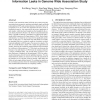419 search results - page 22 / 84 » Statistical relational learning of trust |
Publication
We state the problem of inverse reinforcement learning in terms of preference elicitation, resulting in a principled (Bayesian) statistical formulation. This generalises previous w...
NAACL
2007
13 years 10 months ago
2007
Relation extraction is the task of finding semantic relations between entities from text. The state-of-the-art methods for relation extraction are mostly based on statistical lea...
ICDM
2008
IEEE
14 years 3 months ago
2008
IEEE
Recent research has shown that collective classification in relational data often exhibit significant performance gains over conventional approaches that classify instances indi...
ICDM
2005
IEEE
14 years 2 months ago
2005
IEEE
The presence of autocorrelation provides a strong motivation for using relational learning and inference techniques. Autocorrelation is a statistical dependence between the values...
CCS
2009
ACM
14 years 3 months ago
2009
ACM
Genome-wide association studies (GWAS) aim at discovering the association between genetic variations, particularly single-nucleotide polymorphism (SNP), and common diseases, which...

